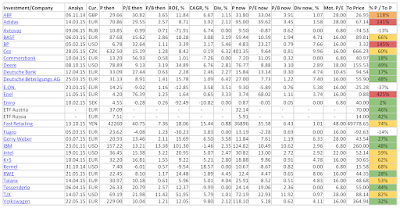
- BEST STOCK INVESTMENT GUIDE HOW TO
- BEST STOCK INVESTMENT GUIDE FREE
BEST STOCK INVESTMENT GUIDE HOW TO
This takes the onus of deciding where and how to invest off your shoulders.
The robo-advisor decides how to invest your money and allocate your assets based on your self-identified risk tolerance, financial goals, and time horizon. The three big advantages of robo-advisors are: Robo-advisors use algorithms to automatically manage an investment portfolio, usually comprised of ETFs (see ‘Types of Stocks to Invest In’ below). But if you’re just learning the ins and outs of the market, it’s best to start investing with a robo-advisor rather than jumping headfirst into investing independently. You should be! The sooner you start investing the more you’ll earn over time. It’s a good sign that you’re anxious to invest. Step 2: Dip Your Toes in with a Robo-Advisor In general, younger people have a longer investment runway and can usually afford to take on more risk than those closer to retirement. People say, “I have a high tolerance for risk.” What they actually mean is, “I have a high tolerance for making a lot of money, fast.” They are not the same thing. Now ask yourself: Why am I investing in stocks? Is it to fund a child’s education? For a mortgage down payment? Saving for retirement? Just for fun? Identifying your personal financial goals lays the groundwork for investing, because it determines how much you’ll need to invest and how high or low your risk tolerance is. If you have funds for the first two buckets in place, the funds in the 3 rd bucket can then be directed toward investing in stocks. Money you won’t need for a while (5+ years)Īmong the money making up the funds in the first two buckets should be a reasonably sized emergency fund, held in cash. Money you need in the short term (within 1-3 years). Step 1: Assess Your Financial Resources and Goals Here’s a digestible, step-by-step guide you can refer to so that you stay steady and on target throughout your investing journey. Technology has made stocks more attainable today, but this at-your-fingertips access combined with the sheer volume of available investment options can also make the investment process intimidating. Step-by-Step Guide to Investing in Stocks Stocks are good for beating inflation because they’ve historically had stronger returns than GICs, savings accounts, or government bonds. If our investments don’t keep up with the rate of inflation, we fall behind. Even low inflation gradually eats into our savings. Investing in stocks is still one of the best ways to maintain buying power over the long term, particularly in retirement when we no longer receive inflation-adjusted earnings. From a tax perspective, dividend income is taxed more favourably than salary or rental income (but not quite as favourably as capital gains), so again, your wealth grows relatively quickly. Shareholders get the cash at the same time that the share price (hopefully) rises, and these dividends are usually better than what you would get from a GIC or savings account. Many established companies pay dividends, and they tend to increase their dividends annually think of it like getting a raise every year. Deriving income from capital gains is a tax-efficient way to build wealth, since a relatively high amount of that income stays in your pocket. Capital gains are very favourably taxed compared to earnings from a job. When we sell a stock for more than we paid, we “realize” a capital gain. That was a mouthful, so let’s break each concept down into terms that are easier to understand. Investing in common stocks can generate income via three primary means: capital gains from speculation, dividends, and compounding returns to maintain buying power. Types of Stocks to Invest In: Individual Stocks, ETFs, and Mutual Funds. Step-by-Step Guide to Investing in Stocks. How to Make Your Mortgage Interest Tax Deductible. Should I Use a Personal Loan to Pay Off My Credit Card Debt?. Tax Changes Canadians Need to Know About. A Look Into A Decade of Canadian Spending. Crypto Trading Tips You Need to Know About. Should I Invest During a Market Downturn?.  Investment Glossary: The Terms You Need To Know. Should You Keep All Your Money In One Bank?. Is a Hybrid Bank Account Right For You?. Best High-Interest Savings Accounts in Canada. Can You Get a Loan While Receiving ODSP?. Are Premium Cards Worth the Annual Fees?. How to Increase Your Credit Card’s Limit. How to Make the Jump From a Secured to an Unsecured Credit Card. What Credit Card Should You Have at Your Income Level?.
Investment Glossary: The Terms You Need To Know. Should You Keep All Your Money In One Bank?. Is a Hybrid Bank Account Right For You?. Best High-Interest Savings Accounts in Canada. Can You Get a Loan While Receiving ODSP?. Are Premium Cards Worth the Annual Fees?. How to Increase Your Credit Card’s Limit. How to Make the Jump From a Secured to an Unsecured Credit Card. What Credit Card Should You Have at Your Income Level?. 

What’s the Best Age to Get a Credit Card?.Scotiabank Passport® Visa Infinite* Card.
BEST STOCK INVESTMENT GUIDE FREE
Hotel Credit Cards That Come With a Free Night.Best Prepaid Cards and Secured Credit Cards.







 0 kommentar(er)
0 kommentar(er)
